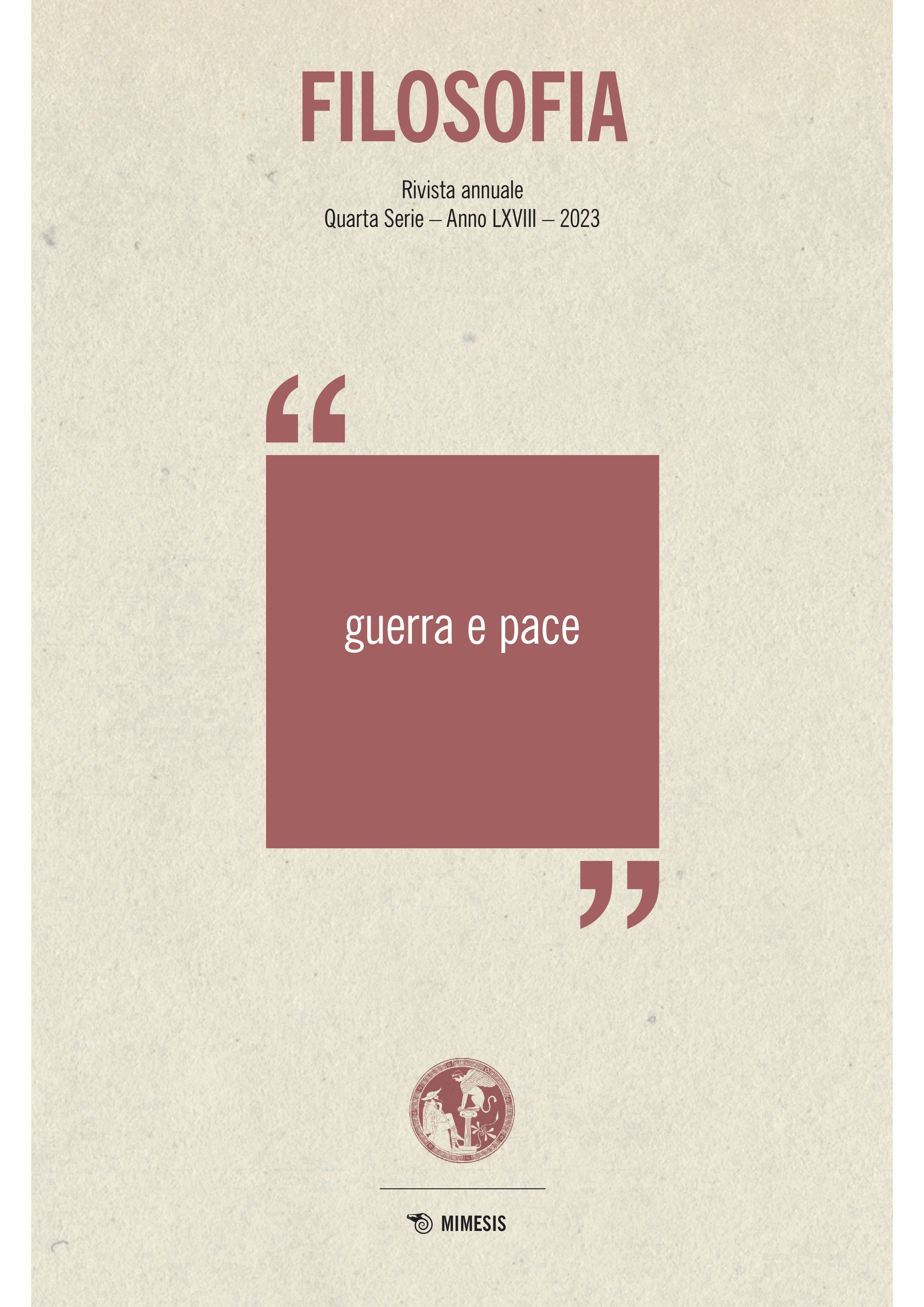Conflict, choice and meaning
DOI:
https://doi.org/10.13135/2704-8195/9216Keywords:
conflict, description, interpretation, peace, reflexivityAbstract
Conflicts involve institutions and hence also the rules through which the institutions get a grasp of both the world around them and their own interactions. This indicates that the connection to principles and to the interpretation of norms plays a potentially important role in the explanation or understanding of conflicts. The choice-interpretation link must be examined. In an interactive setting, choices call for interpretations which pertain to the relevant background principles (their implementation, their respective weights in the determination of actions). Trust in a shared order, for example among States on the international scene, calls for limits to the legitimate interpretations of such principles. Moreover, the intricacy between the description of situations and the interpretation of those norms which give a framing to the interactive processes must be taken into account. Shared descriptions play a role in the evolutive interpretation of benchmark norms, and the agents must pay attention to the fact that the observation and description of their own action impact this interpretation. The relevance for peacekeeping is explored through several examples.
Downloads
References
Bahri Korbi, Fadia, Kaouther Ben Jemaa-Boubaya, et Foued Cheriet. 2019. « Gérer les conflits inter-organisationnels dans les alliances stratégiques internationales : prévenir ou guérir ? ». Management &Avenir 7, n. 13 : 39-61.
Boudon, Raymond, Alban Bouvier, et François Chazel. 1997. Cognition et sciences sociales. Paris : Presses Universitaires de France.
Boudon, Raymond, Pierre Demeulenaere, et Riccardo Viale. 2001. L’explication des normes sociales. Paris: Presses Universitaires de France.
Chazel, François. 1997. « Les ajustements cognitifs dans les mobilisations collectives : questions ouvertes et hypothèses » in Cognition et sciences sociales, Boudon Raymond, Bouvier Alban, Chazel François, sous la direction de., 193-206. Paris : Presses Universitaires de France.
Cherkaoui, Mohamed. 2006. Le Paradoxe des conséquences. Genève et Paris : Droz.
Demeulenaere, Pierre. 2003. Les Normes sociales. Entre accords et désaccords. Paris : Presses Universitaires de France.
Douglas, Mary. 1986. How Institutions Think. Syracuse et New York : Syracuse University Press.
Ferry, Jean-Marc. 1998. « De l’élection de valeurs à l’adoption de normes » in La rationalité des valeurs, Mesure Sylvie, sous la direction de, 143-182. Paris : Presses Universitaires de France.
Jarvie, Ian Charles, et Jesus Zamora-Bonnila, sous la direction de. 2011. The SAGE Handbook of the Philosophy of Social Science. Thousand Oaks, CA : SAGE Publications.
Mantzavinos, Chrysostomos. 2011. « Institutions » in The SAGE Handbook of the Philosophy of Social Science, Jarvie, Ian Charles, Zamora-Bonnila Jesus, sous la direction de., chap. 19, 399-412. Thousand Oaks, CA : SAGE Publications.
Mercier-Ythier, Jean. 2022. Raison économique et raison politique. London : ISTE Editions.
Mercier-Ythier, Jean. 2022. « Introduction » in Raison économique et raison politique, Mercier-Ythier Jean, 1-34. London : ISTE Editions.
Mesure Sylvie, éd. 1998. La Rationalité des valeurs. Paris : Presses Universitaires de France.
Opp, Karl-Dieter. 1983. Die Entstehung sozialer Normen. Tübingen : Mohr-Siebeck.
Opp, Karl-Dieter. 2001. « How do Norms Emerge? An Outline of a Theory ». Mind & Society 2, n. 1: 101-128.
Picavet, Emmanuel. 2011. La Revendication des droits. Paris : Classiques Garnier.
Picavet, Emmanuel. 2021. « Dialogue, compromis et philosophie sociale ». Diogène 3-4, n. 275-276 :143-156.
Saint-Pierre, Charles-Irénée Castel de. 1713. Projet pour rendre la paix perpétuelle en Europe. Goyard-Fabre Simone, sous la direction de. Paris : Garnier Frères.
Downloads
Published
How to Cite
Issue
Section
License
Copyright (c) 2023 Emmanuel Picavet

This work is licensed under a Creative Commons Attribution 4.0 International License.
This work is licensed under a Creative Commons Attribution 4.0 International License



